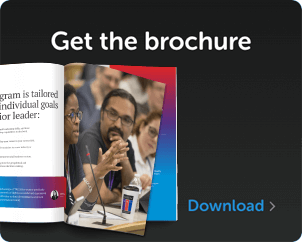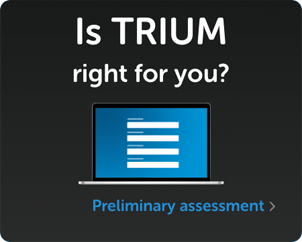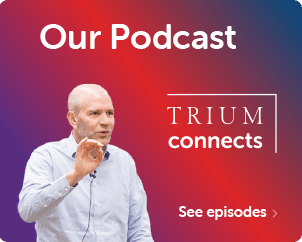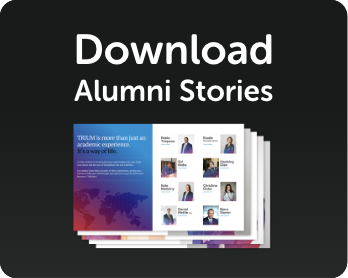
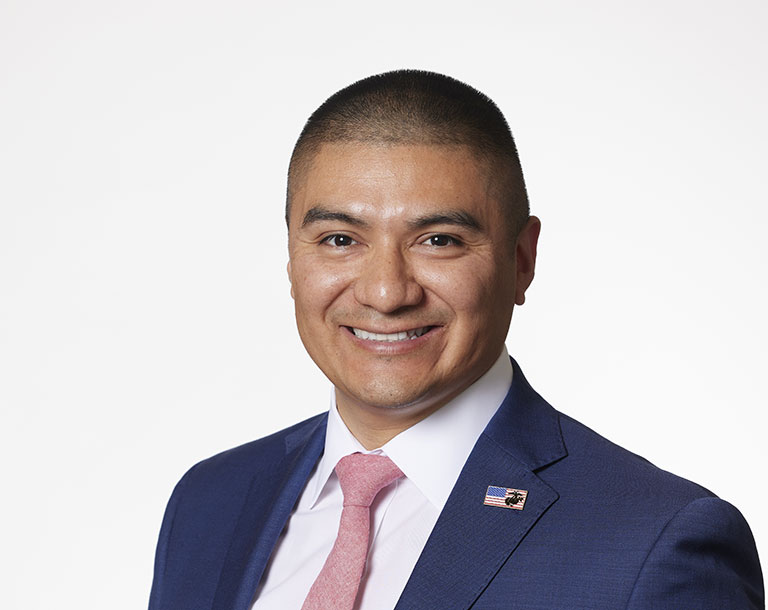
Pablo Timpson
Pablo Timpson (Class of 2024)
Vice President, Head of FCM Risk, HSBC
Pablo Timpson emigrated to America from Ecuador when he was 11, and he credits his mother with giving him the opportunity to be “first generation everything” – he was the first in his family to hold an undergraduate degree, graduate degree, and an MBA. The sacrifices made by his mother is a motivating factor for Pablo to continue to pursue challenges and growth opportunities—which led him to pursue an EMBA from TRIUM.
TRIUM was the only school Pablo applied to, as he was drawn to its highly global focus. Given his multi-cultural background and his personal love of travel (he cites Uruguay, Vietnam, Iraq, India, China, Thailand, Cambodia, Guatemala, and Costa Rica as some of the most impactful countries he’s visited), he sought out a program that would allow him to experience different cultures. “The curriculum’s international focus, the travel, and the global cohort of students was the winning ticket for me,” he says.
Pablo recently spoke with TRIUM about what he learned about active listening and leadership, how the program impacted his work in risk management, and the wild way he knew he’d bonded with his cohort.
Why was right now the time to make an investment in your career and attend TRIUM?
What I’ve learned over the years is that there is never a right time for anything. When I started the program, my son was less than a year old, and I knew that the older he got, the harder it would be for me to complete the program.
I also knew that in 10-20 years, maybe sooner, having an executive MBA from brand-name schools and the experience that comes with it would deliver a return on investment.
Can you describe what your day-to-day job role is? How did TRIUM make an immediate impact on the way you approached your work?
In my current role at HSBC, I serve as the Head of Futures Risk, focusing on safeguarding our financial well-being. This involves assessing and monitoring market trends for potential exposures that could impact the Futures business. I chair monthly and quarterly committees with executive management and members of various supporting teams to discuss ongoing and potential risks of the futures business. I also collaborate with front office and other departments to ensure regulatory compliance and optimize risk management practices.
It’s hard to describe, but TRIUM renewed my sense of optimism and gave me a broader perspective in my day-to-day work. Additionally, it reinforced my global mindset. HSBC exists in 60 countries and territories, and I benefited from the global perspective, cohort and the guest lecturers and professors.
Can you describe one or two a-ha moments you had, either in class or in casual conversations with your cohort?
I had an a-ha moment the first week. When we met in London, I was in awe by the people I met: over 50 people being represented by over 30 countries—some from countries I couldn’t pronounce! There were CEOs, people running family business, and second-generation business owners. There were others who were entrepreneurial and didn’t follow the corporate life as we do in US. Everyone had an impressive level of academic and professional success, and the ability to connect with them and learn about their way of life, business, and culture was mind-blowing.
One big skill that I took away from the program from a leadership perspective is active listening. There were so many great minds in the program – doctorates, doctors, lawyers, and businessmen and women. I didn’t feel the need to contribute to the conversation all the time, because it was nice to just listen to others share their accomplishments and experiences. In my current job, a lot of good leadership comes down to making people feel special and heard. It was a skill I had, and I was able to hone it in the program.
Can you tell us about the bond you developed after that first week in London? How do you plan on staying connected with your cohort in the future?
The first module in London was invigorating—I was getting a laying of the land, and every day was something new. Throughout each classroom session we did group work and over time the repetition of group work connected us closer. By the last module, there was a group of us skydiving from a skyscraper in Dubai. That shows the level of bonding that happened between the first and last modules!
I plan to stay connect with my cohort and with the alumni network—the alumni events that the school organizes are helpful. It is an effort we have to continue to make and part of the investment you make in the program is having access to the alumni network. I hope to attend Module 7 [an annual reunion for TRIUM cohort alums].
You served in the United States Marine Corps from 2004-2008. How did the skillset and discipline you honed during your service parlay into your career? What are the parallels between military service and global business leadership?
The Marine Corps values honor, courage, and commitment. Commitment was also required to complete the TRIUM program and to be successful. I was juggling competing priorities: an infant son, business travel, program assignments and program travel. Being committed and seeing it through reminded me that I’m more confident than many people. I have no plan B. There’s no other way. It has to get done.
Also, the military and global business are similar in that there are structures and hierarchy in place. Transitioning from the military to business hierarchy was an easy transition; one of the main principals both share is that in order to lead you have to know how to follow and vice versa.
How did TRIUM impact the way you consider risk and risk management? Can you pinpoint a new perspective or framework it gave you?
TRIUM has excellent faculty and guest lectures that provided insightful and timely market trends from their respective fields. It really pushed me to think broader and adopt a truly global outlook to risk management.
The program reinforced the frameworks we applied at work in a new way. It opened my eyes more to the future risks that we are going to encounter, including AI, cryptocurrencies, cybersecurity, and the role of money in the market. In financial markets every action has a reaction, and everything is connected. The program made me more aware, shared a ton of resources, and I am able to stay up on market trends.
How would you describe your TRIUM experience in three words?
Adventurous, challenging, and worldly.

